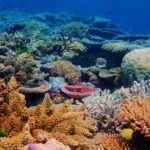
(NEW YORK) — Researchers have discovered a new method that could encourage the restoration of degraded coral reef populations, which have been declining around the world due to record-high marine temperatures.
The sounds of a healthy reef could be used to encourage coral larvae to recolonize damaged or degraded reefs, according to a study published in the journal Royal Society Open Science on Tuesday. Underwater speakers that play the sounds of a healthy reef, such as fish calls, were found to help coral larvae settle at rates up to seven times higher.
Researchers at the Woods Hole Oceanographic Institution have been recording underwater sounds from coral reefs in the Caribbean for close to a decade, Nadège Aoki, a marine biologist at the Woods Hole Oceanographic Institution in Massachusetts and author of the paper, told ABC News. During that time, they observed that healthier reefs tended to have more diverse fish assemblages as well as more complex soundscapes.
Fish make sounds by strumming on their swim bladder and crunching and scraping on corals, Aoki said. Other sounds of the reef could include the crackling of snapping shrimp, according to the researchers.
“They have a sound environment that is distinctive and gives kind of an acoustic signature to the reef,” Aoki said.
In their first days of life, coral larvae make a permanent decision of where they will settle and metamorphose into adults — swimming or drifting with the currents in an effort to seek the right conditions to settle. The sounds of the reef are important settlement cues, the paper found.
Corals are immobile as adults, so the larval stage is their only opportunity to select a good habitat.
The researchers collected larvae from adult colonies of the mustard hill coral species off the coast of the U.S. Virgin Islands and re-placed them on three reefs along the southern coast of St. John — one of which was healthy and the other two labeled as relatively degraded, with sparse coral and few fish.
The larvae were placed on the reefs’ little cups in order to create a controlled environment at distances of one, five, 10 and 30 meters from the solar-powered speakers, which played the sounds of a healthy reef recorded about 10 years earlier, according to the paper.
After collecting the cups, the researchers found that the larvae that were placed near underwater speakers settled at a rate of about twice as much, Aoki said.
“This effect decreased as you got farther away from the speaker,” she added. “Low-frequency sound appears to have an impact on their settlement behavior as well.”
The experiment, sponsored by the Vere and Oceankind Foundations and the National Science Foundation, was conducted twice in the summer of 2022.
The oval-shaped larvae, about the size of a grain of rice, are covered in ciliary hairs, leading the scientists to believe they are sensing the sound waves through the epidermis, Aoki said, adding that the exact mechanism in which the corals are potentially hearing by is not yet known.
The researchers embarked on the study in response to the “alarming” rates at which coral reefs are declining, Aoki said. The results of the study suggests that acoustic enrichment could be a new method to restore coral reefs, the researcher said.
Aoki believes that the method can be used in nurseries both on land and off the coast to restore coral reef populations. In addition, underwater speakers have the ability to broadcast to a large area, she said.
Reef populations off the coast of Florida and in the Caribbean experienced a large bleaching event over the summer due to record-breaking marine heatwaves. Reef populations will need all the help they can get to recover from climate change-induced stressors, Aoki said.
“We’re observing thermal heating and bleaching events happening at more regular frequencies than they have in the past, and that makes it very difficult for reefs to have sufficient time to recover and grow back in between these disruptive events,” she said.
Copyright © 2024, ABC Audio. All rights reserved.
